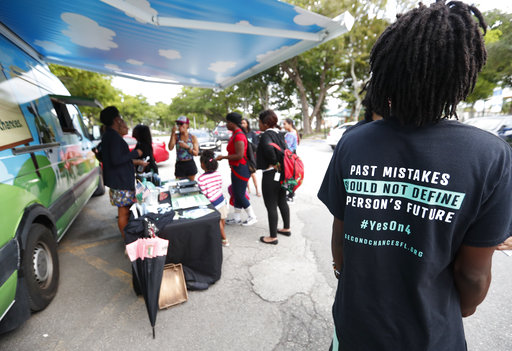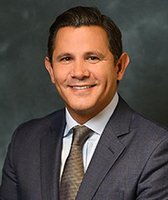Stand up for the facts!
Our only agenda is to publish the truth so you can be an informed participant in democracy.
We need your help.
I would like to contribute

Former President Donald Trump and former first lady Melania Trump leave March 19, 2024, after voting in the Florida primary election in Palm Beach, Fla. (AP)
If Your Time is short
-
Former President Donald Trump is expected to soon face a jury verdict on felony falsifying business record charges.
-
The Florida Department of State website states that “a felony conviction in another state makes a person ineligible to vote in Florida only if the conviction would make the person ineligible to vote in the state where the person was convicted.”
-
New York restores the right to vote for a person convicted of a felony upon release from incarceration. If convicted felons are not incarcerated, they are eligible to vote.
Former President Donald Trump can still run for the White House if he is convicted of a felony in New York. But as a Floridian, could he still vote for himself?
Trump is charged with 34 counts of falsifying business records in an alleged scheme to cover up a hush money payment to adult film actor Stormy Daniels before the 2016 presidential election. The criminal trial is unfolding in Manhattan and closing arguments are expected after Memorial Day. Trump also faces Georgia state and federal felony charges, but he is unlikely to face trials before Election Day.
Most legal experts PolitiFact interviewed said they thought it was unlikely that Trump, a Palm Beach County voter, would lose his voting rights if convicted of a felony. A spokesperson for the Florida Department of State and the media office for the Florida Commission on Offender Review did not answer our emails. It’s unlikely that state officials will address this question unless required to do so because of litigation, or because an official asks for an advisory opinion.
Trump can also still run for president if he is convicted of a felony.
Here’s what we learned about Trump’s voting rights if he is convicted of a felony in New York.
People gather Oct. 22, 2018, around the Ben & Jerry's "Yes on 4" truck at Charles Hadley Park in Miami. Amendment 4 restores voting rights to many felons. (AP)
The states set laws about whether felons lose their voting rights and how they can regain them. In the District of Columbia, Maine and Vermont, felons never lose their right to vote, even while incarcerated.
In 23 states, felons lose their voting rights only while incarcerated, according to the National Conference of State Legislatures. In some other states including Florida, felons have to meet requirements to regain voting rights, such as paying off fines, fees and restitution.
Some lawyers we interviewed pointed to uncertainties or confusion about whether Trump could lose his voting rights. Some Floridians with felony records have been tripped up by the rules. The Florida Rights Restoration Coalition dropped a case against the state after the state agreed to develop rules to update the process for felons seeking advisory opinions about whether they can vote.
"As just this one instance shows, the state of Florida has made it extraordinarily difficult and some cases impossible for somebody with a criminal record to know whether they are eligible to vote," said Nicholas Warren, an attorney at the American Civil Liberties Union of Florida. "The rules around whether you can vote should be easy and clear to understand, and it is the obligation of the state to provide that information to everybody who wants to exercise that role."
Florida historically has had one of the tougher procedures for felons to regain their voting rights.
In 2018, Floridians voted to restore voting rights to felons after they completed the terms of their sentence, including parole or probation, except for those charged with murder or sexual assault. Previously, felons had to ask the Florida Cabinet, which includes the governor and other statewide elected officials, whether they could regain their voting rights.
The voting rights amendment’s advocates had hoped the measure would streamline the process. But it remains messy, because the state has no easy way to determine whether felons have met all the terms of their sentence, including paying fines.
Trump faces a potential out-of-state conviction. Experts on Florida’s law pointed to the section of Florida’s Department of State website that states: "A felony conviction in another state makes a person ineligible to vote in Florida only if the conviction would make the person ineligible to vote in the state where the person was convicted."
New York law passed a law in 2021 that restores the right to vote for people convicted of a felony upon release from incarceration, regardless if they are on parole or have a term of postrelease supervision. Voters don’t lose their right to vote unless they are in jail serving a sentence for a felony conviction. People whose jail sentences are stayed pending appeal do not lose their voting rights, said Kathleen R. McGrath, spokesperson for the New York State Board of Elections.
"Former President Trump would therefore need to be actually incarcerated during the time of the November election to lose his ability to vote," said Neil Volz, an expert in felon laws and the deputy director of the Florida Rights Restoration Coalition, the group that advocated for the felon voting rights amendment.
The ACLU of Florida’s guide to voting rights for felons states that if someone was "convicted outside of Florida, their voting rights are governed by the state where they were convicted."
Many legal experts have expressed doubt that Trump, if convicted, will receive jail time because the charge is a nonviolent, low level felony and he has no previous convictions. One possibility is that the jury could convict him of a misdemeanor.
"I think it’s exceedingly unlikely that he’s sentenced to a term of imprisonment even if convicted, and so I think it’s exceedingly unlikely that he’s going to lose his voting rights based on anything that happens in NY," Justin Levitt, Loyola Law School professor, told PolitiFact. (Levitt served 2021-22 as the White House's first senior policy adviser for democracy and voting rights.)
But if Trump is convicted and sentenced to prison, Levitt wrote on the Election Law Blog "I’m quite confident that there would still be a vigorous appellate process — lasting many months at a minimum — before any incarceration began, and before his right to vote in Florida were put in jeopardy."
Jennifer Blohm, a Florida election lawyer, said she was not sure whether Trump would lose his voting rights. But she said if he did, he could go before Florida’s clemency board to have his rights restored. The Florida Cabinet serves as the clemency board.
Barry Richard, a lawyer who has represented politicians in Florida, pointed to Florida’s Constitution in Article VI Section 4 which states:
"No person convicted of a felony, or adjudicated in this or any other state to be mentally incompetent, shall be qualified to vote or hold office until restoration of civil rights or removal of disability."
Richard emphasized that sentence’s construction and the comma’s placement. That first phrase "no person convicted of a felony" does not include the phrase "in this or any other state" but the second phrase about mental incompetence does include that phrase.
Therefore, he said, someone could argue that the language was written intentionally to draw a distinction — or someone could argue it doesn’t make any sense to apply another state’s law for mental incompetence but not a felony.
"You can argue it either way," Richard said. "I find no case law addressing the question, nothing in the legislative history indicates that there was any intention there. If he is convicted it would have to await a judicial interpretation."
RELATED: Read all of PolitiFact’s coverage on Donald Trump indictments
Our Sources
Florida Department of State, Constitutional Amendment 4/Felon Voting Rights, Oct. 14, 2020
Florida Constitution Article VI, Accessed May 21, 2024
American Civil Liberties Union of Florida, Voting with a criminal record in Florida what you need to know, August 2022
New York State Board of Elections, Voting after incarceration, Accessed May 21, 2024
Brennan Center for Justice at New York University school of law, Voting Rights Restoration Efforts in New York, May 4, 2021
Brennan Center for Justice at New York University s school of law, How Could Trump’s New York Hush Money Trial End? May 14, 2024
Brian Tyler Cohen, Trump at risk of LOSING voting rights in Florida, May 2024
Republican Voters Against Trump, Clip of Chris Christie, Nov. 28, 2023
Danny Rivero, X post, May 17, 2024
Election Law Blog, No, Trump’s not losing his right to vote this fall. May 17, 2024
USA Today, Could Trump lose his right to vote in the 2024 presidential election? Maybe. April 22, 2024
NPR, If convicted this year, Trump could lose the right to vote for himself, April 26, 2024
ABC News, What are the potential outcomes of Trump's hush money trial? May 20, 2024
National Conference of State Legislatures, Restoration of Voting Rights for Felons, April 17, 2024
News Service of Florida, A lawsuit over Florida's felon voting restrictions has been dropped, May 15, 2024
PolitiFact, Biden’s promise related to restoring felons’ voting rights stalls, Dec. 16, 2021
PolitiFact, Biden's statement on Trump's 2020 mail voting is Half True, Jan. 13, 2022
PolitiFact, Can Donald Trump run for president if charged and convicted of removing official records? Aug. 9, 2022
PolitiFact, Q&A: Can Trump run for president if indicted in Stormy Daniels case? What happens if he's arrested? March 20, 2023
Email interview, Kathleen R. McGrath, spokesperson for the New York State Board of Elections, May 21, 2024
Email interview, Neil Volz, deputy director of the Florida Restoration of Rights Coalition, May 21, 2024
Email interview, Justin Levitt, Loyola law school professor, May 17, 2024
Telephone interview, Barry Richard, Florida lawyer, May 21, 2024
Telephone interview, Jennifer Blohm, Florida lawyer, May 21, 2024
Telephone interview, Nicholas Warren, ACLU of Florida staff attorney, May 22, 2024



































